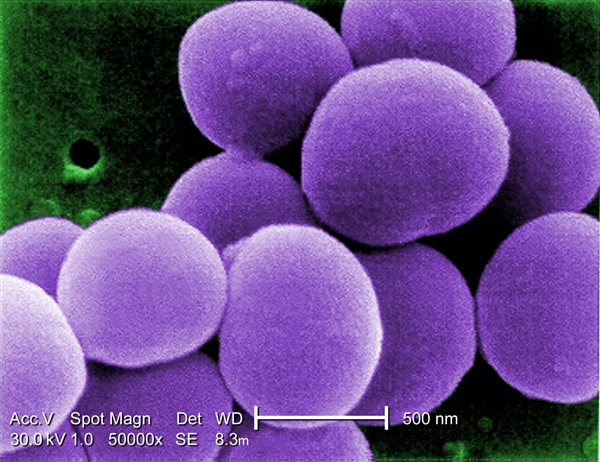9 Mar. 2021. An international consortium is funding a vaccine to prevent increasingly resistant Staphylococcus aureus infections found in health care facilities. The Carb-X partnership is initially awarding biotechnology company Affinivax Inc. in Cambridge, Massachusetts $3.5 million for developing the vaccine, with the company eligible for another $18.5 million in later milestone payments.
Affinivax develops vaccines that generate multiple types of immune responses and, according to the company, provides broader and stronger protection against pathogens. In this case, the target pathogen is Staphylococcus aureus or S. aureus bacteria, which in most people are not immediately infectious, or cause at most mild symptoms. In health care facilities and among patients with other underlying conditions, however, S. aureus infections can lead to serious and life-threatening consequences, including blood stream infections like sepsis, pneumonia, heart valve, and bone infections. In addition, S. aureus is becoming more resistant to common antibiotics, making these infections more difficult to treat.
Affinivax’s technology, called Multiple Antigen Presenting System or MAPS, produces antigens that invoke two types of immune responses. The company says MAPS generates simple and stable rhizavidin proteins that bind polysaccharide to protein antigens, with a process more direct and durable than used in conventional vaccines. The result, says Affinivax, is a strong immune response from both B- and T-cells in the immune system, providing broader protection than conventional vaccines.
Produces antibodies and two types of T-cells
The company’s MAPS technology is based on research by Richard Malley and colleagues at Boston Children’s Hospital and Harvard Medical School, licensed by Affinivax. A paper in the journal mBio by Malley, Fan Zhang, Ying-Jie Lu, and others, in October 2018, shows a vaccine based on the MAPS approach protects lab mice against later exposure to S. aureus bacterial infections. The mice produce both antibodies to reduce mortality and two types of helper T-cells — Th1 and Th17 — that clears bacteria from the animals’ GI tracts and prevents skin abscesses. Malley, Zhang, and Lu are Affinivax’s scientific founders.
“To date, attempts at developing Staphylococcus aureus vaccines have not been successful, with approaches based on the premise that antibody responses are sufficient to provide protection,” says Malley in a company statement. “Data from our group and others support the view that, in addition to antibodies, Th1 and Th17 responses to Staphylococcus aureus proteins are critical to achieve broad protection against this pathogen.”
The award from Carb-X supports further preclinical development by Affinivax of its S. aureus vaccine to advance the vaccine to an investigational new drug application to the Food and Drug Administration, and an early-stage clinical trial. Affinivax is receiving $3.5 million initially, with the company eligible for further payments of up to $18.5 million for achievement of preclinical, clinical, and manufacturing milestones.
Carb-X, short for Combating Antibiotic-Resistant Bacteria Biopharmaceutical Accelerator, is an international initiative to fight antibiotic resistance. The public-NGO consortium is made up of the Biomedical Advanced Research and Development Authority, an agency of the U.S. Department of Health and Human Services, National Institute of Allergy and Infectious Diseases in NIH, Germany’s Federal Ministry of Education and Research, and the Wellcome Trust, a foundation based in London, that provide funding or in-kind services. Partnering organizations include Boston University law school where Carb-X is headquartered.
More from Science & Enterprise:
- Vaccine Developer Gains $11M in Early Funds
- Carb-X Funding Nanoscale Sponge to Treat Sepsis
- Commentary – New Models Needed for Antibiotic Resistance
- Carb-X Funds Drug-Resistant Bacterial Vaccine
- New Antibiotic Discovered to Fight Drug-Resistant Bacteria
* * *


 RSS - Posts
RSS - Posts
You must be logged in to post a comment.